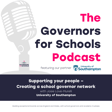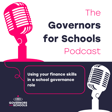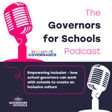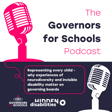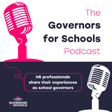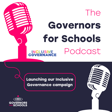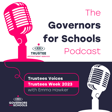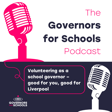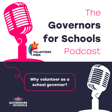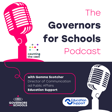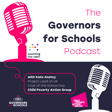Introduction to Podcast and Cost of Living in Education
00:00:10
Speaker
Hi everyone, welcome back to the Governors for Schools podcast under the third week of our Counting the Cost campaign, in which we dig down into the key issues affecting the education landscape as the cost of living crisis continues to impact school communities.
00:00:25
Speaker
This week, we're taking a look at how governors can support schools in providing enriching learning experiences for less advantaged pupils when budgets are tight. For governors, this could mean taking a hard look at the ways in which budgets are spent and how school leaders are working to provide learners from low-income families the support they need to thrive.
00:00:44
Speaker
As listeners are probably well aware, the COVID-19 crisis widened attainment gaps between less advantaged pupils and their better off peers, an issue that threatens to get worse as the cost living crisis bites. So how can governors ensure schools make strategic decisions that boost social mobility and make the most of a tight budget?
Guest Introductions and Bridging Attainment Gaps
00:01:04
Speaker
To help us answer this question today, I guess from three organizations committed to bridging attainment gaps and ensuring all pupils receive the inspiring education they deserve. I'm really pleased to be joined by Susannah Hardiman, CEO of Action Tutoring, Anne-Marie Canning, CEO of the Brilliant Club, and Martin Galway, Head of School Programs at the National Literacy Trust. Welcome, everyone.
00:01:28
Speaker
So to kick us off, it would be great to learn a little bit more about your organizations and how you see the cost of living crisis affecting pupil learning and development at the moment.
00:01:39
Speaker
So let's start with Anne-Marie, if that's okay. I'm Anne-Marie, I'm the CEO of the Brilliant Club. I've been with the charity since the first day of lockdown, so around three years. We are a nationwide education charity, helping the least advantaged pupils access the most highly competitive universities.
00:01:59
Speaker
and then also helping them to flourish once they study there as undergraduates. We work with around 22,000 pupils a year, over 1,000 schools, and we are certainly seeing the cost of living biting for the young people that we work with on a daily basis.
Inclusive Programs for Disadvantaged Children
00:02:15
Speaker
So we've been doing a lot of work recently thinking about how we can sort of design our programme so that from the off, they're inclusive in terms of socio-economic backgrounds.
00:02:25
Speaker
Our target pupils are often those on pupil premium, first in family to university, living in areas that are not socioeconomically advantaged. So for us, it's really important that we hardwire in from the very beginning a program that is inclusive of those children and families. So that's meant working with our schools and university partners to really put together sensitive and thoughtful responses to the cost of living.
00:02:50
Speaker
crisis. It's just very pragmatic stuff. For example, we've committed that No Child will visit a university campus and not be fed. It's a really basic, simple principle, but it's one that we all need as partners to commit to in order to make sure No Child is going home hungry from
00:03:07
Speaker
what is supposed to be a very exciting day visiting a university. We've also been doing things thinking about our tutors and looking after them in terms of the cost of living, our PhD tutors who, you know, themselves are facing into cost of living issues. So it's really thinking about cost of living, one for the children, young people and families we serve, the schools and university partners, and then thinking also about our tutor base as well.
Action Tutoring and Educational Support
00:03:34
Speaker
Fabulous. Thanks Anne-Marie. Susannah.
00:03:38
Speaker
I'm Susanna, I'm the founder and CEO of Action Tutoring. I've been with the organisation for really quite a long time now, just over a decade and we work nationwide with schools across England with eight main hubs covering most of the country and support about six and a half thousand pupils a year.
00:03:55
Speaker
And our core aim is to support pupils at the end of primary or the end of secondary who are at risk of leaving those crucial junctures without basic standards in English and maths, because we believe that having those basic standards is really fundamental to unlocking those doors to further education, employment or training.
00:04:14
Speaker
We started off working with GCSE pupils and it didn't take long to realise that if we could tackle some of those misconceptions earlier on, we could set pupils on a great trajectory to achieve at secondary. So we launched in primary schools about six years ago and now support pupils on that year five, year six cusp as they're heading into secondary school, making sure they're as ready as possible to hit the ground running in those core subjects in English and maths to set them on a really strong trajectory to future attainment.
00:04:43
Speaker
All of our work is delivered in partnerships with schools and we've certainly been more aware than ever of the budget challenges that schools are facing at present and we've seen that sort of creeping in over the last couple of years and sadly no signs that it's about to abate swiftly.
00:05:00
Speaker
Our model has always been part fundraised and part school contribution to cover our costs and we've been thinking really hard about what's the balance between quality and impact of delivery whilst trying to keep our costs as reasonable to schools as possible.
00:05:16
Speaker
At present, we're also benefiting from funding from the National Tutoring Program and know that that's funding schools are accessing. So we've been working closely with schools to think about how they can maximise that, how they can use it to impact as many pupils facing disadvantage as possible. And we're already thinking hard about how we can support schools as that NTP subsidy decreases next year and then comes to an end in 2024.
00:05:41
Speaker
so that we're not having to increase our costs to them and that valuable support can continue to be offered. We're acutely aware that that attainment gap has only continued to sadly get bigger as a result of the pandemic so it strikes us that although that NTP subsidy is decreasing there's certainly no shortage of need out there for schools and for pupils and trying to make that work in as financially a clever way as possible for schools is something we're thinking really hard about.
National Literacy Trust and Literacy Development
00:06:12
Speaker
Great. Thanks, Susannah. And last but not least, Martin.
00:06:18
Speaker
Hi, I'm Martin Galway. I'm Head of School Programs at the National Literacy Trust, an independent national charity. We work across four nations, both in a mixture of schools facing work and working through our current number, 17 community hubs that reaches all across England into Scotland and Wales and moving towards working within 100 of the areas most in need.
00:06:42
Speaker
Our work extends across schools programs. That's essentially my world. I work with schools programs along the lines of reading for pleasure, development of libraries, book gifting, developing volitional readers and primary CPD. So the development of cost-effective evidence-informed CPD training conference events for schools.
00:07:04
Speaker
Beyond that we undertake large-scale research, we undertake annually the largest research relating to literacy and annual survey that draws upon the views of teachers, school leaders and children and from that we're able to map trends over time
00:07:21
Speaker
We're currently very interested in the impact of the cost of living crisis published a report just in December 2022 and moving into looking at financial capability because of the long term effects this is likely to have. We also work to steer policy wherever possible and to galvanise collective action across the third sector within the profession itself and drawing upon our corporate partners.
00:07:46
Speaker
So, for example, one of the programmes in my stable is the Primary School Library Alliance work, whereby we're aiming to transform 1,000 school libraries by 2025. We've got an extensive range of partners helping us in that endeavour and the need has only gotten greater. That report that we published in December 2022 shows that a time when people are finding the squeeze of funding is affecting absolute life essentials.
Community Organizations and Social Mobility
00:08:13
Speaker
items that could be considered non-essential such as books which we would argue are essential especially if we're serious about making a long-term difference to literacy and by extension to intergenerational cycles of poverty we need to be holding that line and making sure that we're pushing forward to ensure access to literature and the life chances that come from literacy for children, young people.
00:08:37
Speaker
It's great. Thank you, Martin. So just to kick us off really into kind of having more of a conversation about this. You know, the cost of living crisis obviously has the potential to really compound issues surrounding social mobility.
00:08:54
Speaker
which all of your organisations are involved with. And I'm just kind of wondering your take on, you know, what role did charitable and community organisations play at this point in helping schools tackle social mobility issues as the, you know, particularly given the fact that school budgets are really tight at the moment. Anyone feel free to kick us off?
00:09:19
Speaker
I think one of the things I've been really impressed with visiting schools that we work with and talking to them is how many are really tapped into so many different charities and organisations in their community that they can point their families to. And I think schools can be that kind of hub of resource and information that obviously requires knowing your families, knowing
00:09:40
Speaker
knowing what their needs might be and then having people that are able to do that signposting but schools being that sort of central place where families can get advice and support for different needs I think can be a really powerful way that schools can sort of work with other providers in the community so that not all the needs are on them.
00:09:59
Speaker
but there is that sort of joined up approach. Food banks are a very obvious one and I know many schools do referrals to food banks and have that close connection but I've noticed an increasing number of other services that have been promoted in schools or leaflets left in receptions and things to available families as I say so the onus isn't all on the school to have to provide that support but is connecting people with others in the community working on specific issues. Yeah absolutely
00:10:29
Speaker
And in terms of the ways in which governors and schools can kind of work together to find these resources, is there any particular sort of advice you'd have in that respect in terms of bringing in third parties?
00:10:46
Speaker
I mean, from my perspective, I think, you know, school governing bodies and multi academy trust governing bodies often have a link governor for pupil premium. I think it would be entirely appropriate at this moment in time to have a link governor for cost of living issues facing the school community because it will be affecting teachers, families,
00:11:07
Speaker
and children as well. A link governor like that can do all sorts of brilliant things, asking the right questions about where people premium funding is going, making sure that that is reaching the students it's allocated to benefit, but then also making sure that the school's really lined up in terms of parental engagement, because really good parental engagement means that you can find out about all types of community assets.
Poverty Proofing and Parental Engagement
00:11:32
Speaker
So you've got three nationwide education charities on the podcast here, but each school will be surrounded by organizations like a food bank or baby banks or benefits advice. There's a whole range of sort of community assets that can be drawn upon. And it's really through having good conversations with parents that you start to learn about those very often.
00:11:53
Speaker
it's parents running them for the benefit of other parents in very low-income areas. So I think governors asking the right questions, also speaking regularly to teachers about what they're seeing, asking the questions about what you're seeing in your classrooms right now. I work in Bradford as part of something called the Alliance for Life Chances. I've heard very, very regularly
00:12:18
Speaker
teachers expressing concern about lack of warm clothing. And so asking frontline teachers, what are you seeing? What are the sorts of issues that are presented in your classroom so that you can respond in governing body terms? Because, you know, for me, cost of living is a strategic issue for schools.
00:12:36
Speaker
It sounds very domestic, talking about clothing and uniform swaps and things like referrals to a local food bank, acting as a warm bank, making sure you're staying open for homework clubs where kids can stay warm. That all sounds very pragmatic and domestic, but it's actually an important strategic issue where if you tie it all together, you can create an environment where kids, despite facing very, very difficult circumstances, still have a chance to flourish.
00:13:03
Speaker
I mean, the final thing I'd say is if I was a governor right now, I have been a governor in the past, but not at the moment, I'd be looking into poverty proof in my school. So this is an approach that emerged in the Northeast. It's really easy if you give at Google, you know, really thinking about how you hardwire in advantage rather than disadvantage to your school community and school architecture. Great. Thank you, Anne-Marie. It's really, really helpful.
00:13:30
Speaker
So in terms of the kind of the skills and the educational experiences that we should kind of prioritize to help boost young people's prospects, do you have any kind of a take on that? Because we've been talking very generally about kind of bridging attainment caps, et cetera. Is there any particular skills that you think we could hone in on at this point?
00:13:53
Speaker
I've certainly got some views. I'm going to go early. I think it's a perennial argument that time and time again, the wide range of evidence out there around literacy, and Lord knows there's plenty of evidence in the world of literacy, points towards talk and early talk in particular, if we're serious about being evidence informed in terms of making a difference to the cycles of poverty or disadvantage, or just wide retainment that
00:14:19
Speaker
early talk investment there is going to be critical but at the moment because of the effects of the pandemic not just the earliest talks normally I'd be talking about naught to free and then three to five is being especially critical in terms of how children develop and and the impact that has on
00:14:35
Speaker
not just their attainment at 11, at secondary and beyond, but also in terms of the social aspects within school. Following the pandemic time and time again, we're seeing reports in year two, three, so seven-year-olds, eight-year-olds, nine-year-olds, where you can see the legacy effects of the time out of the classroom, the impact on the sorts of work that could be handled in that way that you can only really structure when you're in the classroom. We've made incredible leaps and gains in terms
00:15:06
Speaker
The sources have been able to help us through targeting lessons, through tuition, through delivering CPD, but there's something about the organic talk, the serve and return of a one-to-one discussion in the classroom that you can't be. So that's something that we're looking to prioritise as part of a massive campaign going forward over the next few years. We've always been in that space, but we're redoubling our efforts along the lines of how we support parents in particular, harking back to the comments made just now around how important parents are in this.
00:15:36
Speaker
We have what we call literacy champions who are kind of a bridge between schools, other local community service providers, so in health, in social care, food banks. If you're not having that, you do need to look out to your parent community and so reaching out and extending these messages around the importance of early communication and how simple it often is. That's one of the things that can sometimes be most surprising is once you get the chance to talk directly to people that are perhaps
00:16:03
Speaker
a little harder to reach, maybe a little fearful of coming into school grounds. How reassuring it is for them to actually hear we're not talking about rocket science here or anything that's going to be too expensive. It's actually as simple as these few steps that we want to share with you here and now. Great. Thanks, Martin. Anne-Marie, do you have something to say?
00:16:23
Speaker
Yeah, absolutely. Just around engaging parents in that early talk. In Bradford, we've got an initiative called 50 Things Before Five, which is all about the sort of ordinary things you can do with your little one to get them talking. And I remember very powerfully
00:16:38
Speaker
some parents in a local area saying, well, I don't have access to a museum or a library around here. And, you know, 50 things before five says, right, let's get into the supermarket and use the supermarket as a place to start talking and using words and encountering new things.
00:16:55
Speaker
And so really encouraging parents to work with what they've got right now. It's not about having a massive collection of books as lovely as that is. It's really about getting that talk going that Martin described. So yeah, just to enhance that message around encouraging parents to work with what they've got. And also just seeing parents as assets to their children's lives. I think very often I encounter folks who see particularly low income parents as sort of a barrier to their children.
00:17:25
Speaker
Our experience at the Brilliant Club through running an initiative called Parent Power, which is working in around 15 places in the UK, places like Knowlesley and
00:17:35
Speaker
you know, Fenland, places like that, is that parents are desperate to help their kids. They're desperate to give them a great start in life. What they're very often lacking is a sort of routine to do in that. And so that's why I talked about parental engagement earlier, because if we get that right, between school and parent, you've basically created a very powerful alliance for boosting children's life chances straight off the bat.
Balancing Academic and Wellbeing Needs
00:18:01
Speaker
It's great. Thank you. Suzanne, do you have anything to add at all to this?
00:18:07
Speaker
Completely agree about the points about parents and it's something that I think there's just so much more that can be done to strengthen those ties and sometimes actually as a charity coming into a school we haven't always found it easy to have that access to parents because inevitably those relationships sit with the school but certainly where we have got parental buy-in to our programs alongside the school encouragement it's as Anne Marie said a really powerful
00:18:32
Speaker
combination. I think one of the things that I've been thinking about a lot recently is just how tricky the balance is for schools and for governors when making budget decisions at the moment of which needs do you prioritise the most. And I'm acutely aware that we can offer the best tutoring programme we possibly can, but if pupils are coming hungry, they're not in a good emotional state, they're struggling with behaviour, getting back into the classroom post-pandemic, then it doesn't matter how good the English amass
00:19:00
Speaker
tutoring might be that they're not ready for that learning and that sort of balance of holistic needs, how do we make sure they're clothed, they're fed, they're emotionally and mentally in a good place that they're ready to learn are all critical factors to the success of a program like ours. And I think that is an increasing challenge for school leaders and for governors to
00:19:21
Speaker
think through what is it that I'm prioritising here? Is it mental wellbeing? Is it those basic physical needs of clothes? Is it the academic attainment? Obviously in an ideal world it would be all of those things but when budgets are increasingly tight and needs are only ever increasing I think some of those decisions are really challenging to make. Yeah I think your point about wellbeing is really important and I wanted to ask actually in terms of
00:19:50
Speaker
you know, integrating sort of wellbeing, sort of initiatives into the learning experience. I wonder if you have anything to say about that. Is there anything in your organisations that like takes wellbeing into account in its programmes at all? Particularly because obviously wellbeing is becoming more of a pressing issue as the cost of living crisis continues. Yeah, Martin.
00:20:18
Speaker
Yeah, I mean, I'll give you an example, and there's a bit of lesson from it. So we have something that is branded as Take 10. It's been quite present and visible on our social media channels. And it's born out of research that basically suggests, you know, just reading for 10 minutes a day can have a benefit to your wellbeing. But what that can easily become is this really crude message of, okay, read for 10 minutes, bang, I feel better. I think it's about maintaining a real sense of what do we mean by wellbeing. There's been almost, I should
00:20:46
Speaker
I almost got well-being fatigued myself when I was feeling most stressed during the lockdown. There were so many things coming my way. I was hoping to adapt to online delivery of all kinds of services, you know, a whole new field. And you can almost be bombarded with so much that you kind of feel this isn't speaking to me, this isn't necessarily addressing my needs.
00:21:05
Speaker
So within any talk about wellbeing, I think we really need to think about the staff wellbeing, you know, and how much capacity they have to be able to look at, you know, what am I prioritising? How clearly am I seeing my own class and children in front of me? What I would also urge is that we do think about those things that go beyond, you know, just things that tend to be associated with wellbeing, those sorts of holistic measures along the lines of, you know, exercise, taking time to relax,
00:21:33
Speaker
And just having going to sound talk obsessed, but having time to really talk and get to know the children that you're working with, because, you know, so much of the work we do to improve can be driven by data. How well do we know those children in our classroom? And that goes back to that capacity at a time when you're trying to gain what might feel like lost ground.
00:21:53
Speaker
Carving out space to have meaningful conversations in class, it's going to be really important. And so I think that in itself is a message I would want to get through. How are we as a school, how are we as governors supporting the school to carve out space to really know the children beyond any data coming from measures or tests or assessments? Great. Thank you. Anne-Marie or Susanna, anything to add to that talk?
00:22:16
Speaker
Just to say some of the most exciting work I've seen post pandemic has been the Young in Covid project in Bradford which was all about allowing young people to listen to other young people across the city to come together and they've made a film.
00:22:31
Speaker
if you type Jung into COVID into a search engine, you'll be able to see it. So that ability to narrate their own experience of what happened in COVID, to talk about that, has been, I think, a really exciting part of how we've started to respond to some of the needs in the city of Bradford as we've emerged from COVID. So we know that wellbeing is one of those sort of
00:22:53
Speaker
primary needs that then engenders an ability to engage in curriculum, you know, be successful in the school setting. And as we say, you know, everything's connected. So it's really important as a governor that you sort of, it's a difficult job, but looking at all these different facets of a young person's educational experience in your school, working out what's a priority at that moment in time and starting to really think about how you phase things together, what needs to happen for one class versus another.
00:23:21
Speaker
It really is that sort of discussion that will enable governing bodies and teachers to make really excellent decisions about what a young person or a cohort of young people need, first and foremost. What I will say is, you know, we know that things like tutoring will make a massive difference in
00:23:39
Speaker
helping to close some of these attainment gaps which are increasingly widening. I think it's really important we don't lose sight of all the fun extracurricular activities as well. We've had young people who've not had a chance to do much fun stuff for quite a number of years, so I always encourage folks to think, yeah, let's do the catch-up tutoring provision.
00:23:57
Speaker
But also it's really important kids get a chance to explore outside of the curriculum. That's what we're all about, the Brilliant Club. Also get a chance to enjoy things like sports, music, theatre, all the things that perhaps were not available to them during the lockdown years.
00:24:14
Speaker
That's great, thank you. Susannah, did you have something to say there? Yeah, I couldn't agree more about the fun. I'm a governor of a primary school in South East London and that's a conversation we've certainly been having as a governing body of let's make sure that those residential trips that need subsidising it's a school with a high percentage of pupil premium, let's make sure that those
00:24:36
Speaker
those trips are still going ahead, that those are prioritised, as you say, Anne-Marie, all the sort of extracurricular activities and so on. And again, I've been really impressed with the way some schools are being really quite innovative to run some of these things in a slightly more cost-effective way than perhaps they have before.
00:24:53
Speaker
But just going back to the point about wellbeing and the importance of teacher wellbeing as well as pupil wellbeing, again another initiative that the school where I'm a governor at has been implementing that I've been really impressed with is actually using some additional fundraising they received to employ a wellbeing coach for staff.
00:25:13
Speaker
with the rationale that if teachers are in as healthy a place as possible then they're going to be all the better able to deal with the needs in their classroom and to support their pupils and I thought that was just really interesting use of that additional funding they received to focus that on their staff well-being as well as all the giving out that's going on to families and pupils.
00:25:34
Speaker
Yeah, definitely. All of these things are really interconnected as something that part of this campaign we really want to highlight. Martin, and do you have something to add on? Anne-Marie was next. Oh, Anne-Marie, sorry. Losing sight of the hands. Anne-Marie.
00:25:50
Speaker
Yes, I'm just going to sort of build on that point a little bit. One of the things again we did in Bradford where I have this role working on a broad alliance for social mobility is we established a school wellbeing service for teachers, you know, to recognise
00:26:06
Speaker
the toll that COVID lockdown teaching has taken on teachers. It strikes me that we've continued that service and it's needed just as much now because the emotional toll and burden of supporting children who are in
00:26:22
Speaker
some in dire circumstances the constant it's corrosive to see children in a scenario where they don't have enough eat to eat or they're not warm enough it really does take its toll on teachers so i think there's a growing recognition that you know teachers.
00:26:38
Speaker
are really bearing the brunt of some of this in terms of seeing it presented in their classroom with you know children and young people they care about facing very difficult circumstances but also I think staff more broadly you know our teachers aren't immune to cost of living
00:26:53
Speaker
issues and neither are our support staff. And I think it's really important as a governor that, yeah, we care about children, we care about the families that we serve, but also the staff across the school, how are they coping in the current environment, be it your teachers or your support staff across the school? Yeah, it's a really important point and it is something that we will be kind of addressing towards the end of the campaign because it's something we don't want to miss out on. Martin.
00:27:23
Speaker
Yeah, I mean, first, I just want to echo that. I think it should be a standing item at any governor's meeting for as long as it's needed, really, or if not permanently, because we need to understand, you know, what those sorts of tensions can lead to within school and how we can go about supporting colleagues to make sure that those sorts of impacts on the staff themselves and the leaders, because, you know, at the end of the day, there is so much that travels all the way up to the head, the SLT.
00:27:51
Speaker
and then who's there here. And I think this week we're acutely aware of how important that is that we're making sure that our school leaders are especially well supported. I just wanted to make a case for agency and community as well. So, you know, setting aside the NLT, which is all about community, I'm a governor in Harlow, absolutely privileged to work in an amazing school and they've worked so hard to develop the community that does bring the parents in. In fact, you know, very many times we'll have agency workers choosing to
00:28:18
Speaker
have visits on the site because of the nature of how things feel there and how less threatening it is. But just things that are quite simple to implement, now that we're out of the restrictions of lockdown, things like stay in play, that happens so often with younger children, but taking that across the whole school, I'm assuming everyone notices, you know, stay in play, parents come to a path and then they spend some time in the classroom.
00:28:38
Speaker
get to enjoy some of what the children are doing and there's a degree of agency in terms of children choosing what they're going to share with their parents. That can be such a powerful driver that's low cost, takes it across to whole school so it's a shared sense of endeavour. A whole school book study, I can't tell you, I mean I've written multiple blogs about that, we've presented at international conferences, just a simple act of having a part of the year where everyone's working on the same thing.
00:29:03
Speaker
And I think it works on a sort of same principle as a lovely project we're developing at the moment where we're looking at intergenerational story work between residents of care homes and children in schools. But as a teacher, you know, there would be some children that you would see an entirely different human being when they near the top of the school, you know, maybe year five, year six, go and read with a four, five, six year old.
00:29:23
Speaker
and providing those opportunities for kind of, I guess, a school based version of matrix working where, you know, the usual boundaries of, okay, this is our year group mission. No, here we're looking at how we develop in community.
00:29:36
Speaker
can be really powerful. Learning counsellors are actually truly learning counsellors. They don't just, you know, talk about what's going to be the allowed snacks on the school playground. They actually go and deliver lessons, say, or go and do interviews with smaller children. They're just wonderful ways by which you can give the whole collective of a school a shared sense of mission and just something that sits outside of something that might seem high level strategic.
Questions for Governors on Supporting Pupils
00:29:58
Speaker
Yeah, it's a really good point. So in terms of, say you were a governor on a governing board looking to kind of ask questions about this topic, about bridging attainment gaps, about increasing people engagement with some of the initiatives you mentioned. What are the kind of the key questions you would ask during this meeting? What would be your top priorities?
00:30:28
Speaker
Would it be too simple to say what are we doing and why are we doing it and how do we know that it's doing what we want it to do? I mean, that's their perennial governor questions. But when money's tight, you need to ask them more rigorously, really, in a supportive way, of course, keeping in mind much of what we discussed already. But, you know, I think we've seen proliferation of.
00:30:49
Speaker
services, packages, products that are tapping into the whole drive to be evidence informed, the needs to address gaps that have emerged over the last few years. And so it's quite a well-funded, aggressive market. So being really clear on the shared evidence base and what it means to be critical around, true criticality around where we're spending our money and why is always going to be a central part of what I'd be asking.
00:31:15
Speaker
Absolutely, starting with the fundamentals. Anne Marie. Yeah, so I guess I'd start from first principles, which is this is not a time to become less ambitious for children from pupil premium backgrounds. It can feel like cost of living is dragging your eyes down to making sure kids are fed and watered and warm. And that's fair enough. But we've got to make sure we toggle up and down and we make sure we've got a strategy for our pupil premium children.
00:31:43
Speaker
and other children who have specific needs within the school. So having a very clear strategic intent for those kids and being ambitious about their futures, that's the first thing I'd say. Then I'd ask, you know, where's the money going and how do we know that that's a good use of money? So what's the evidence that this is, you know, an intervention that makes a difference that we want to secure for the young people that we work with?
00:32:07
Speaker
My fourth question would be, how are we making life a bit easier for families who are struggling? And can we do more to make things a little bit easier? And my final question would be is, how do we know we're not contributing to the problem? So how do we know we're not paying poverty wages to our cleaners or our support staff? And so for me, those five questions, sort of strategic, where's the cash going? How do we know it's making a difference? How can we make things easier?
00:32:34
Speaker
for our communities. And finally, how do we know we're not contributing to the problem? That's the sequence I'd probably work through. And then if I'm allowed one more question, I'd ask the teachers who are in front of me how they're doing as well. Yeah, great. That's a great set of questions. Susanna.
00:32:53
Speaker
I think really any organisation coming into a school or wanting to work in a school needs to be able to demonstrate their value and their impact and if you're looking at what's already going on in a school those questions of value and impact are surely front and centre but I think it's also about governors just keeping an eye that that support is being spread holistically across the school that it's not all sort of targeted at one particular need or one particular year group and that can be challenging when difficult decisions
00:33:22
Speaker
need to be made, but making sure as far as possible needs are being met holistically around mental health, wellbeing, physical needs, academic attainment and so on. But for all of those, I think impact and value need to be front and centre. And value doesn't have to mean cheap. It doesn't mean the cheapest programme out
Final Insights and Next Week's Focus
00:33:41
Speaker
there. We just want to clarify that, you know, it might well be worth paying for a programme that's a bit more expensive, but gets
00:33:47
Speaker
results at the end of the day, so it's definitely not about just sourcing the cheapest things out there in the community, but looking at what difference will they really make, what's the evidence base for them and there's so many fantastic resources to help schools make some of those decisions now. For sure. Martin, do you have something to add there?
00:34:07
Speaker
Yeah, I mean, it's just a very simple question, but also just how can I be most helpful? I mean, as a governor, especially if you're a governor that's got some level of expertise or experience within the field, you can be tempted to try and do all sorts of things to try and help save the world in your local area. But really knowing what would be most helpful to the school, you know, keeping in mind the requirements of the role of governance itself. That's a very important question to be asking because you can almost be doing too much to try and help at this moment in time.
00:34:35
Speaker
I think financing governors can be asking is whether there's any external funding in the community that the school can tap into and I know some schools are incredibly proactive at sourcing that applying for additional grants and obviously that requires time and capacity
00:34:52
Speaker
to do that, but I've seen some great examples of schools doing quite a bit of their own additional fundraising from businesses or local grant making bodies in the community to help cover the cost of residential trips or pay for extra interventions or extra curricular activities and so on. And again, that's probably a question just worth asking. Are there any pots out there that we could be looking into?
00:35:16
Speaker
Yeah, thanks everyone. That's really helpful, insightful comments there and things that listeners can bring forward into their meetings. So I appreciate that I've taken up quite a bit of your time today.
00:35:31
Speaker
I guess just to wrap up, should we just go around and see if you have any final thoughts and just let us know how governors and education professionals can find out more about your organisations. Should we start with Martin?
00:35:48
Speaker
You can find out more about our organisation by heading to the National Literacy Trust website. Given that we've been talking so much around community and in particular parents or engagement, schools may want to flag our Words for Life sister site that has a whole host of activities, supporting resources,
00:36:10
Speaker
banded into age groups so that parents can quite easily find relevant material to support them as they support their children's literacy development. It's great, thank you. Anne-Marie.
00:36:25
Speaker
I think probably my final thought is how important it is that we have brilliant school governors to help schools and colleges weather what they're seeing at the moment and that the skills you're bringing are really providing very valuable support in a very difficult
00:36:43
Speaker
few years and months for the sector. So, you know, to keep doing what you're doing and thank you so much for doing it. And if you want to connect with the Brilliant Club, we've got a very distinctive name. So if you just give us a Google, you can get in contact about any of our programs. Some of them are People Premium funded and some of them actually are free for schools and young people to participate in. So, yeah, give us a Google and come and see if we can help you guys out.
00:37:09
Speaker
It's great. Thank you. And yeah, I want to reflect what you just said at the beginning about the importance of governors. There might be some non-governors listening to this. So, you know, if you're interested, do apply through Governance for Schools. You're sort of helped every step of the way through the application process and it's really rewarding experience. So, yeah. Susannah.
00:37:33
Speaker
I'm going to steal something Anne-Marie said earlier, which now is not the time to lower our aspirations for pupils. It's a really challenging circumstances we're in at the moment, but as I'm sure listeners know, the attainment gap has never been wider in a decade and that need to stay focused on how we can do what we can for disadvantaged pupils and keep those aspirations high feels really important despite the challenges.
00:38:00
Speaker
If you want to find out more about Action Tutoring, again, give us a Google, actiontutoring.org.uk. We work in schools across the country. Our work is heavily subsidised by fundraising to try and keep costs as reasonable for schools as possible. And 70% of the pupils we support are eligible for the pupil premium. So we particularly love to connect with schools in areas of high disadvantage.
00:38:25
Speaker
Great. And we will include links to all of your organisations in the show notes and on our campaign resources page. So if anyone's interested, please head there at www.governorsforschools.org.uk. You'll also find links to our campaign articles, video content and some helpful resources to support you and your role as a governor.
00:38:50
Speaker
So just to wrap up, many thanks to all of the guests today. Thank you to Alan Overy for generously sponsoring the Counting the Cost campaign and making possible the production of our campaign materials. Next week, we'll turn our attention to how the cost of living crisis is affecting staff recruitment, retention and wellbeing in schools and how governors can help.

